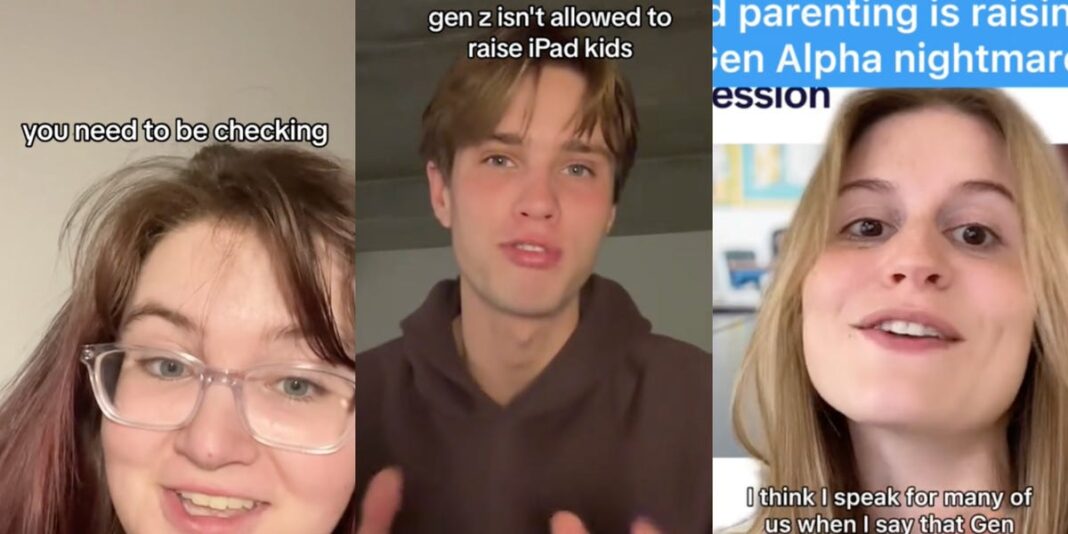- Gen Z is nervous they’re going to raise a generation of iPad kids.
- The topic of iPad kids has spawned an entire subset of videos on TikTok.
- “I need everybody else from my generation to promise that we are not going to raise iPad children,” one person said.
Gen Z is getting nervous about parenting. Specifically, they’re worried about raising a generation of iPad kids.
The term “iPad kids” is used to refer to kids who are raised without restrictions on their screen time, and they’re a popular topic of conversation on TikTok.
In fact, there’s an entire subset of TikTok videos — racking up millions of views — where users call out and mock iPad kids, sometimes by acting out their behaviors themselves. Think screaming when their device is taken away, total disinterest in speaking to others, and having no idea how to play with other toys.
TikTok user @gabesco, who has 2.9 million followers on the platform and says he’s 21 years old, posted a video about the topic online on November 8. It has since garnered more than 16 million views.
“I need everybody else from my generation to promise that we are not going to raise iPad children,” @gabesco says in the video.
He also calls out parents for pacifying their kids with iPads instead of giving them attention. “You’re raising Gen Alpha, and they’re bizarre and terribly behaved,” he says.
It’s a sentiment echoed online by other members of Gen Z, who were born between 1997 and 2012.
TikTok user @hopeyoufindyourdad, who says she’s a Gen Z born and raised in Minnesota, posted a video on the topic online on Saturday. It’s been watched more than 3.8 million times.
“I think I speak for many of us when I say that Gen Alpha, or the iPad kid generation, is so far an absolute terrifying nightmare to deal with,” she wrote.
In the video, she says she’s been a nanny for children raised with unrestricted screen time. These kids, the says, are particularly challenging because they are disinterested in creative activities.
“If you try and take an iPad out of an iPad kid’s hands, not only will they start throwing a tantrum so large, but they will start physically hitting you,” she said in her video.
Sophie Puchulu, who posts on TikTok as @squishiesophie2 and has 1.5 million followers, shared a video on Monday with her own experiences. In the video, which has been watched more than 1.4 million times, she says she was exposed to adult content at a young age because she grew up with “unregulated internet access.”
“Adult men would message me, and then I would send them inappropriate pictures back to them,” she said. “At the time I had no idea that was weird.”
“If you’re a parent, you need to be checking your kids’ phone, it doesn’t matter how much you trust them,” Puchulu added.
Not everyone is convinced there’s cause for concern. Some people online, for example, think Gen Z’s fears are just another iteration of an ongoing generation war.
“Not trying to start a culture war but much of online gen z culture seems to be about gen z exceptionalism & villainizing all other generations,” one person wrote on X, formerly known as Twitter, in response to the viral TikTok videos.
“iPad kids, video games kids, TV kids, same hysteria. We’ve been there before,” another person wrote on TikTok.
The debate over how much screen time parents should allow their kids to have is a long-running one.
When researchers looked at over 60 studies from 1999 to 2014 on how screen time affects kids, they discovered that 90% of those studies found that too much screen time was associated with poorer sleep. Meanwhile, a 2019 study by a group of Canadian pediatricians — examining more than 2,400 children aged 24 to 36 months — found that children who spent more time on screens tended to perform poorly on tests measuring early childhood development.
The American Academy of Pediatrics says there isn’t enough evidence to support set screen time limits, which it stopped recommending as of 2016. Instead, the Academy now recommends rules focusing on avoiding particular types of content and parents watching content with their kids.
Source link









